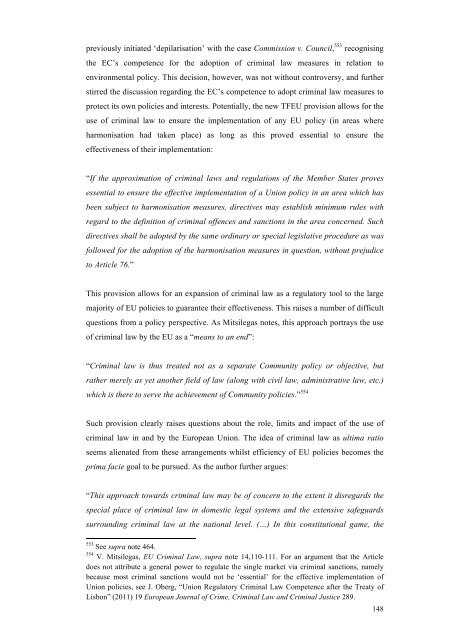The evolution of European Union criminal law (1957-2012)
The evolution of European Union criminal law (1957-2012)
The evolution of European Union criminal law (1957-2012)
You also want an ePaper? Increase the reach of your titles
YUMPU automatically turns print PDFs into web optimized ePapers that Google loves.
previously initiated ‘depilarisation’ with the case Commission v. Council, 553 recognising<br />
the EC’s competence for the adoption <strong>of</strong> <strong>criminal</strong> <strong>law</strong> measures in relation to<br />
environmental policy. This decision, however, was not without controversy, and further<br />
stirred the discussion regarding the EC’s competence to adopt <strong>criminal</strong> <strong>law</strong> measures to<br />
protect its own policies and interests. Potentially, the new TFEU provision allows for the<br />
use <strong>of</strong> <strong>criminal</strong> <strong>law</strong> to ensure the implementation <strong>of</strong> any EU policy (in areas where<br />
harmonisation had taken place) as long as this proved essential to ensure the<br />
effectiveness <strong>of</strong> their implementation:<br />
“If the approximation <strong>of</strong> <strong>criminal</strong> <strong>law</strong>s and regulations <strong>of</strong> the Member States proves<br />
essential to ensure the effective implementation <strong>of</strong> a <strong>Union</strong> policy in an area which has<br />
been subject to harmonisation measures, directives may establish minimum rules with<br />
regard to the definition <strong>of</strong> <strong>criminal</strong> <strong>of</strong>fences and sanctions in the area concerned. Such<br />
directives shall be adopted by the same ordinary or special legislative procedure as was<br />
followed for the adoption <strong>of</strong> the harmonisation measures in question, without prejudice<br />
to Article 76.”<br />
This provision allows for an expansion <strong>of</strong> <strong>criminal</strong> <strong>law</strong> as a regulatory tool to the large<br />
majority <strong>of</strong> EU policies to guarantee their effectiveness. This raises a number <strong>of</strong> difficult<br />
questions from a policy perspective. As Mitsilegas notes, this approach portrays the use<br />
<strong>of</strong> <strong>criminal</strong> <strong>law</strong> by the EU as a “means to an end”:<br />
“Criminal <strong>law</strong> is thus treated not as a separate Community policy or objective, but<br />
rather merely as yet another field <strong>of</strong> <strong>law</strong> (along with civil <strong>law</strong>, administrative <strong>law</strong>, etc.)<br />
which is there to serve the achievement <strong>of</strong> Community policies.” 554<br />
Such provision clearly raises questions about the role, limits and impact <strong>of</strong> the use <strong>of</strong><br />
<strong>criminal</strong> <strong>law</strong> in and by the <strong>European</strong> <strong>Union</strong>. <strong>The</strong> idea <strong>of</strong> <strong>criminal</strong> <strong>law</strong> as ultima ratio<br />
seems alienated from these arrangements whilst efficiency <strong>of</strong> EU policies becomes the<br />
prima facie goal to be pursued. As the author further argues:<br />
“This approach towards <strong>criminal</strong> <strong>law</strong> may be <strong>of</strong> concern to the extent it disregards the<br />
special place <strong>of</strong> <strong>criminal</strong> <strong>law</strong> in domestic legal systems and the extensive safeguards<br />
surrounding <strong>criminal</strong> <strong>law</strong> at the national level. (…) In this constitutional game, the<br />
553 See supra note 464.<br />
554 V. Mitsilegas, EU Criminal Law, supra note 14,110-111. For an argument that the Article<br />
does not attribute a general power to regulate the single market via <strong>criminal</strong> sanctions, namely<br />
because most <strong>criminal</strong> sanctions would not be ‘essential’ for the effective implementation <strong>of</strong><br />
<strong>Union</strong> policies, see J. Oberg, “<strong>Union</strong> Regulatory Criminal Law Competence after the Treaty <strong>of</strong><br />
Lisbon” (2011) 19 <strong>European</strong> Journal <strong>of</strong> Crime, Criminal Law and Criminal Justice 289.<br />
148
















